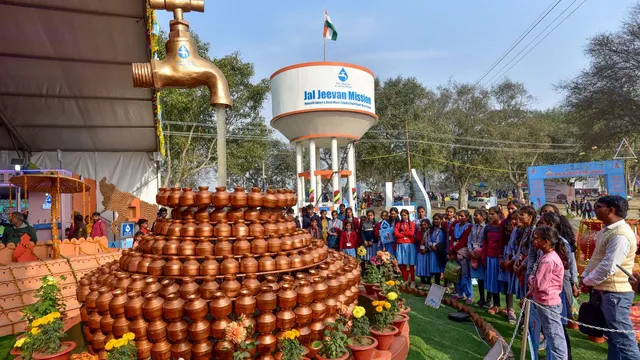- By Deeksha Gour
- Sat, 01 Feb 2025 08:22 PM (IST)
- Source:JND
Budget 2025: The Jal Jeevan Mission (JJM) is a vital initiative launched by the Indian government to provide safe and reliable drinking water to every rural household across the country. Since its inception in August 2019, the mission has aimed to deliver functional household tap connections (FHTC) that supply 55 litres per capita per day of drinking water.
Extension of Jal Jeevan Mission Until 2028
Union Finance Minister Nirmala Sitharaman announced an extension of the JJM until 2028, with a total allocation of Rs 67,000 crore in the Union Budget for 2025-26. This extension is crucial as the mission was initially set to conclude in March 2025. The Uttarakhand state government had requested this extension due to the challenging geographical conditions that complicate the construction of water supply schemes.
ALSO READ: Budget 2025: What Is Dhan Dhanya Krishi Yojana? How It Aims To Benefit 1.7 Crore Farmers | Explained
Progress And Achievements Of Jal Jeevan Mission
As of now, the JJM has successfully connected every household in 13,565 villages with tap water. The target is to provide connections to 14,50,635 households across 15,000 villages in 7,780 Gram Panchayats. Currently, work is ongoing in 1,357 villages, while efforts have yet to begin in 63 villages. The mission aims to cover an additional 40,110 houses in these remaining villages.
ALSO READ: iPhones And Xiaomi Prices To Drop Soon! Sitharaman Slashes Import Tax On Smartphone Parts In Budget
Budget Cuts And The Impact On Mission Goals
Despite the success, the programme faced significant budget cuts during the current fiscal year. The allocation for JJM was reduced by 67.65 per cent during the revised estimate stage for 2024-25, dropping from a budgetary estimate of Rs 70,163 crore to Rs 22,694 crore. However, the new allocation of Rs 67,000 crore for 2025-26, while lower than last year’s estimate, signals renewed commitment to the mission.
The focus of the JJM is not only on providing access to water but also on ensuring the quality and sustainability of water supply systems. The government plans to enhance infrastructure quality and operational management through public participation, known as "jan bhagidhari." Memorandums of Understanding (MoUs) will be signed with states and union territories to ensure that water services remain citizen-centric and sustainable.

